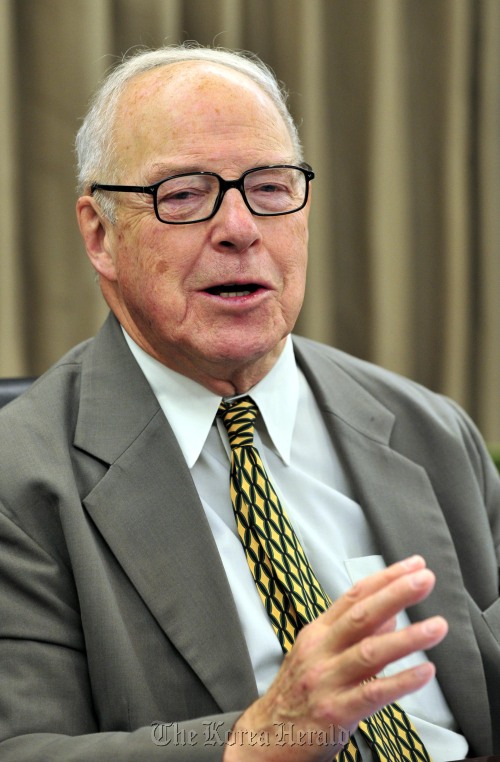 |
Hans Blix, former director-general of the International Atomic Energy Agency, speaks during an interview with the Korean press in Seoul on Monday. (Kim Myung-sub/The Korea Herald) |
Hans Blix, former director-general of the International Atomic Energy Agency, said the U.S. and South Korea’s precondition for North Korea to halt uranium enrichment could make it more difficult to start six-party negotiations.
Blix visited Korea as a member of an eminent persons’ group, or EPG, to provide advice to President Lee Myung-bak for when South Korea hosts the Nuclear Security Summit in March, next year. The group members held their first meeting in Seoul on Tuesday
“The status of North Korea’s nuclear program is relatively clear. … The bigger problem related to six-party talks is that there is no date for them yet, although it seems to me that there is an interest and willingness, on the North Korean side now, to restart them at some certain point,” Blix told reporters in Seoul.
U.S. Under secretary of State for Political Affairs Wendy Sherman said last week in Seoul that North Korea should stop its uranium enrichment program and implement denuclearization measures if it wants to resume the stalled six-party talks.
South Korea’s Unification Minister Yu Woo-ik made a similar statement.
“Demanding concrete action usually is more difficult. We’ve seen that in the case of Iran where outside powers frequently said that ‘we’re willing to discuss with you, provided that you first suspend enrichment.’”
Blix served as chief of the atomic energy watchdog from 1981 to 1997.
He said even though the Fukushima disaster in Japan was “a bump on the nuclear road,” the nuclear energy field should not be discouraged by the incident.
“Nuclear power is an indispensable part of the low-carbon dioxide energies. No energy is obtained at zero risk and the risk from nuclear is low,” he said.
“Perceptions are different from reality and the public needs to know what the reality is. There are many wild descriptions of nuclear dangers.”
Meanwhile, the 15-member EPG will provide consulting and policy advice to Lee on the 2012 Nuclear Security Summit, and raise awareness and importance of the summit around the world until next March.
“Korea is a success story in the nuclear field, as in many other fields including development and democracy. Korea has much experience in nuclear safety, security and non-proliferation, which gives a good reason and basis for Korea as a host (of the nuclear security summit),” he said.
By Kim Yoon-mi (
yoonmi@heraldcorp.com)
